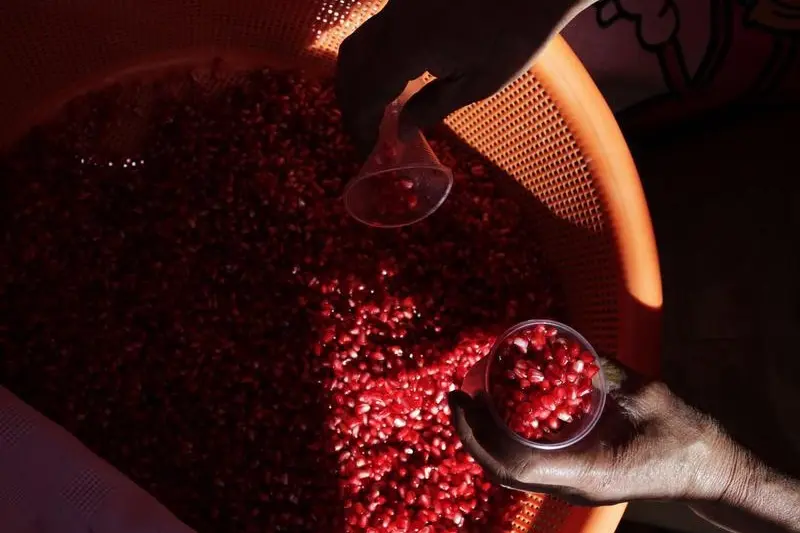PHOTO
They grow many varieties of pomegranate. As the name refers, the 'Alhilu' variety is sweet and occupies the first place. Then come 'Al Qabesi' and 'Malassi' varieties.
Studies issued by the Ministry of Agriculture confirm that pomegranate has multiple nutritional values. The yellow dyes are extracted from it to manufacture silk. It has high sugar and mineral elements such as potassium, phosphorus, calcium and sodium.
Pomegranate is known for its health benefits. It purifies the blood and relieves thirst and dehydration.
Pomegranate is considered good medicine for cough diseases and chest aches, removing conditional worms, and treating kidney stones and urinary tract infections.
Pomegranate trees are 6 meters long. Their branches have small leaves, and they begin to bloom in the second year. The tree's life is more than 50 years.
Pomegranate needs 700 mm of water annually. The need for water increases with the progression of the growing season in the summer (June, July and August). Irrigation should be regular to reduce the effects of cracking fruits.
Locals mention that the pomegranate trees in Jabal Al Akhdar suffer from agricultural pests and disturbance from the aphid insect. They also suffer from 'Black rot' disease, which leads to rotting and cracking of the internal tissues of the fruit.
Jabal Al Akhdar, which is about 2,700 meters above the sea, is classified as one of the natural treasures of the Sultanate. It encourages tourists to come here to beat the heat.
An environmental management plan indicates that Jabal Al Akhdar is part of the Western Hajar Mountains. The mountain enjoys well-known agricultural products that have known economic benefits. Among these products is the manufacture of roses, a traditional craft practised for thousands of years.
After pomegranates, roses are an important crop here. Farmers produce rose water that is used to add special flavours to some food products, such as sweets, Omani coffee and some pastries. It is also used to relieve some of the human body's symptoms, such as fatigue and others.
Al-Jabal Al-Akhdar is also famous for the cultivation of other types of fruits, including apricots, peaches, figs, grapes, apples, pears, saffron. It also harbours rare wild animals such as mountain ibex, deer, leopard and wolf, in addition to a variety of birds.
2021 © All right reserved for Oman Establishment for Press, Publication and Advertising (OEPPA) Provided by SyndiGate Media Inc. (Syndigate.info).





















